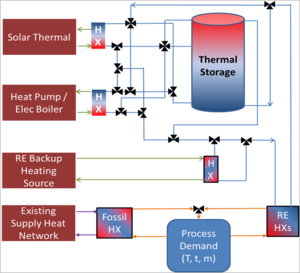WP2-1 Integration of low temperature solar process heat in industrial applications
WP 2-1 Integration of low temperature solar process heat in industrial applications
Hosted by: | University of Kassel |
|---|---|
Student: | Steven Meyers |
Started: | 02/2014 |
Supervisor(s): | Klaus Vajen, Prof. Dr. (University of Kassel) |
Short description
Carbon reduction is often discussed for electricity generation but generally overlooked for required heating in sectors such as food and beverage manufacturing. This research focuses on the integration of solar and other renewable heat to meet their energy needs, often between 60 °C and 200 °C. Initial investigations (via Project GREENFOODS) into the food and beverage sector have indicated that energy efficiency measures are the first steps to reduce CO2 emissions. Once implemented, renewable heat must be realized to further reduce and possibly eliminate emissions, but the pathway to do this is unclear. A number of renewable heat options (solar thermal, heat pumps, biogas, direct electrical heating) now exist, each with their own conversion efficiencies and operating temperature ranges, while competing with both each other and fossil fuels on economics. On straight heat generation costs, some technologies perform better relative to others, namely due to available solar research and technology maturity. For instance, it was recently determined that PV steam generation can deliver cheaper heat than parabolic trough concentrators in lower solar radiation regions. Once heating costs have been fully understood, the integration of these technologies must be optimized to realize the most cost effective renewable heating solution, whether the required renewable heating fraction is 10, 35, or even up to 100%. Optimal solutions derived through techno-economic simulations will depend upon numerous factors, such as available solar radiation, heat load temperatures, storage availability, operating schedule, integration concept, and heating technology/electricity costs. The final deliverable of this work will create industry guidelines for solar and renewable process heat integration concepts to assist planners and facility owners to make better choices to renewably reduce their heating requirements.

